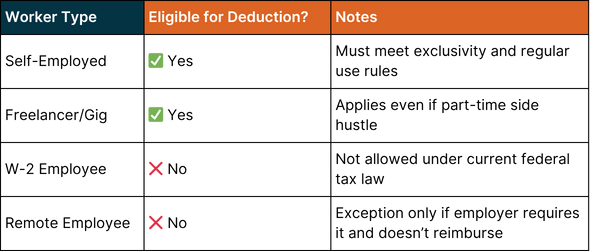.png)
Working from home in 2025? Discover which home office tax deductions you qualify for, how to calculate them, and what the IRS rules are. Maximize your savings with this guide.

.png)
The remote work revolution isn’t slowing down. Whether you're self-employed, freelancing, or running your own business from your living room, the home office deduction can be a game changer.
Yet, thousands of taxpayers miss out on this deduction each year—or worse, claim it incorrectly and risk red flags from the IRS. If you worked from home in 2025, understanding what qualifies, how to calculate your write-offs, and which method to use can mean hundreds or even thousands of dollars in savings.
In this guide, we’ll walk you through the rules, examples, and latest IRS guidelines so you can take advantage of the home office deduction—without triggering an audit.
Remote and hybrid work has become the norm. According to Bureau of Labor Statistics data from early 2024, over 30% of U.S. professionals worked from home at least part-time—continuing a strong trend in remote and hybrid work adoption.The IRS recognizes that maintaining a dedicated work space at home costs money—and if you're eligible, you shouldn’t have to absorb those costs alone.
The 2025 tax year continues to allow qualified taxpayers to deduct home office expenses, but there are strict rules on who can claim them and how. Even the method you choose (simplified vs. actual expenses) can impact your deduction.
✅ The key? Documentation, eligibility, and choosing the right method based on your situation.
Not everyone who works remotely qualifies for the home office deduction.
You can claim the deduction in 2025 if you:
You cannot claim this deduction if:
👉 Example: A self-employed consultant who runs their entire business from a spare bedroom dedicated to work can qualify.
A remote employee of a tech company using their living room couch as a workspace? Unfortunately, not eligible.
Source: IRS Home Office Deduction Rules – Publication 587
If you’re eligible, you can deduct both direct and indirect expenses associated with your home office.
📝 Pro Tip: Keep clear records of all expenses throughout the year. If your office is 200 sq ft in a 2,000 sq ft home, you can deduct 10% of shared expenses under the regular method.
The IRS offers two methods to calculate your deduction in 2025:
When to use: If your home office is small and you don’t want the hassle of tracking utility bills or calculating depreciation.
When to use: If your home office is large, and you have high home-related expenses like mortgage interest, utilities, and repairs.
👉 Learn more: IRS Form 8829 Instructions
The home office deduction is a goldmine if done right—but a red flag if done wrong. Common mistakes include:
📌 Remember: If you get audited, the IRS will want to see proof—so snap photos of your office, measure the square footage accurately, and save receipts for expenses.
Here are expert strategies from Vincere Tax to maximize your deduction:
Let’s clear up one of the most common points of confusion.

Here’s what you should keep on file:
✅ Copy of your lease or mortgage
✅ Floor plan or measurement of office space
✅ Photos of office setup (showing exclusive use)
✅ Monthly utility and internet bills
✅ Receipts for office furniture or repairs
✅ Year-end summary of all expenses
✅ Filed Form 8829 (if using regular method)
📂 Keep records for at least 3 years after filing, per IRS guidelines.
If you’re self-employed or run a business from home, the home office deduction is one of the best legal ways to lower your taxable income in 2025. But it only works if you understand the rules—and document everything carefully.
At Vincere Tax, we specialize in helping remote workers, solopreneurs, and small business owners take full advantage of deductions like this. Whether you want us to run the numbers or review your eligibility, we’re here to help you save more—and stress less.

Yes—if you meet the exclusive and regular use test, you can deduct expenses even if your business is part-time.
Not specifically, but poorly documented or aggressive claims can trigger scrutiny. Use conservative, well-documented calculations.
Yes, but only the business-use portion. You’ll need to estimate or track usage.
You can still claim the deduction for the months you qualified. Just calculate each home office separately.
Yes—if used exclusively for business. These may be deducted in full or depreciated depending on cost and use.
Being audited is comparable to being struck by lightning. You don't want to practice pole vaulting in a thunderstorm just because it's unlikely. Making sure your books are accurate and your taxes are filed on time is one of the best ways to keep your head down during tax season. Check out Vincere's take on tax season!

This post is just for informational purposes and is not meant to be legal, business, or tax advice. Regarding the matters discussed in this post, each individual should consult his or her own attorney, business advisor, or tax advisor. Vincere accepts no responsibility for actions taken in reliance on the information contained in this document.
For business tax planning articles, our tax resources provides valuable insights into how you can reduce your tax liability now, and in the future.